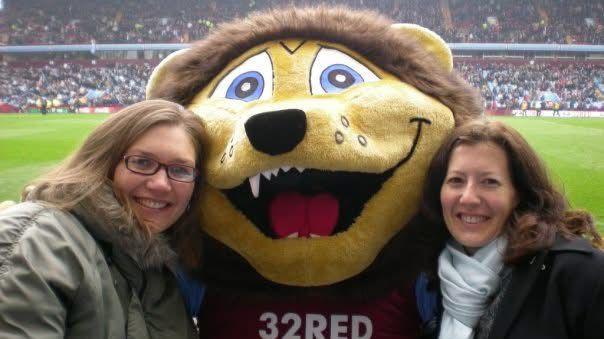'It becomes really hard to separate yourself from it'

- Published
When it comes to our love for a football club, the answer to why we do lies in "both psychological and societal" reasons.
In the first part of her chat with BBC Sport, researcher and co-writer of the Routledge Handbook of Sport Fans and Fandom Danielle Sarver Coombs spoke about the part that identity and tradition play.
And yet when we are caught up in the emotions of a tough defeat or nerves of an important match, we can often ask why we put ourselves through it.
"There are psychological processes at work and physiological ones in terms of how we respond and engage," Sarver Coombs said.
"An example that I always give is when I take the train to work, I go past Arsenal's stadium and I feel literally nothing other than: 'Oh, that's a big building'. Whereas on a train to Manchester, I went by Villa Park and my heart started pounding. I got all excited and was trying to take pictures out the window.
"I had a visceral reaction to this place. We can't pretend we don't have that sort of physical reaction because we do.
"When someone is talking about a controversial decision and I feel myself getting wound up, even though I intellectually know that I can't control it and that it's just a game, my body doesn't know that.
"My gut doesn't know that and so I have this really emotional response and we can't control that."
A 2023 book titled 'Football on the brain: why minds love sport, external' suggests it comes down to 'an understandable and logical consequence of the human mind's natural inclination to find meaning through beliefs... It's a religion as far as the brain is concerned'.
But it not just about what is going on inside the mind but outside influences too.
"There is a sociological element to it because the community part is such a huge driver and benefit for us," Sarver Coombs explains.
"Sociologically, we are driven to be part of communities. We are driven to find our groups that we can be members of. Sport provides a way to do that - this sense that I was chosen to be part of this community and it's something bigger than I am."
As the game expands, unrest among supporters seems to be increasing, but how does that impact this ingrained love for a club?
"You always go through these cycles when the game is changing," Sarver Coombs said.
"Despite all the changes, the traditions remain so strong and it's such a huge draw that it becomes really hard to actually separate yourself from it. Even if you do, it tends to be a short-term separation. You get sucked back in because something happens.
"People don't want that change, but then we adapt to it and continue moving forward."
Browse this page to see lots of fan stories for how you fell in love with your club.
And check out those from other Premier League teams over here